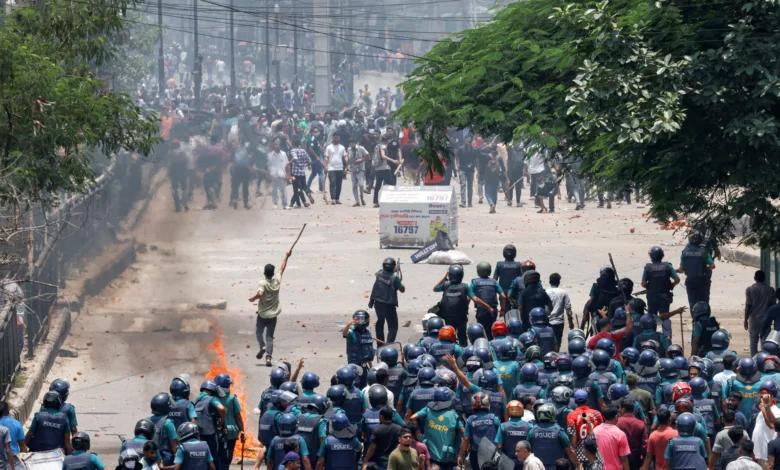
Bangladesh Students Protest Job Quota Policies
Bangladesh Students Protest Job Quota Policies Violence in Bangladesh results in at least six deaths and hundreds injured as students demand reforms to the government job quota system.
The unrest began following the High Court’s decision to reinstate the quota system for government jobs, reversing a 2018 decision by Prime Minister Sheikh Hasina’s administration to abolish it. The quota had reserved 30% of jobs for family members of freedom fighters from the 1971 war for independence. Previous student protests had prompted the government to abolish the quota, but a Supreme Court suspension of the High Court’s order pending a government appeal led to renewed demonstrations. Despite ongoing court proceedings, students intensified their protests after Hasina declined to meet their demands.
What is the quota system?
Introduced in 1972, Bangladesh’s quota system has undergone several revisions over the years. When it was abolished in 2018, 56% of government jobs were reserved under various categories. These included allocations for families of freedom fighters, women, residents of underdeveloped districts (each with a tenth share), indigenous communities (5%), and the disabled (1%).
The recent protests escalated into violence this week following clashes between thousands of demonstrators opposing the quota system and members of the student wing affiliated with Prime Minister Sheikh Hasina’s Awami League party. Police used rubber bullets, sound grenades, and tear gas to disperse protesters who had blocked railway tracks and major roads.
What do the students fear?
Hasina, the daughter of Sheikh Mujibur Rahman, Bangladesh’s founding father and leader of its independence movement, is at the center of criticism regarding the 30% job quota reserved for families of freedom fighters, which protesters claim disproportionately benefits supporters of her Awami League party, who played a significant role in the country’s liberation struggle.
Experts also attribute the unrest to a lack of job growth in the private sector, which contrasts sharply with the stability, regular wage increases, and benefits associated with public sector employment, making these positions highly coveted.

Critics argue that the quota system reduces the number of government jobs available based on merit, disadvantaging candidates who seek opportunities purely on their qualifications. This has fueled frustration among students, particularly amidst high youth unemployment, with nearly 32 million young people currently out of work or education in a population of 170 million.
In Dhaka on July 18, 2024, clashes erupted between police and anti-quota protesters. Bangladesh students have declared their intention to sustain nationwide demonstrations against civil service hiring regulations. This follows a rejection of Prime Minister Sheikh Hasina’s offer of condolences for the seven individuals killed during the protests. The country’s economy, once a leader in global growth, has now stagnated, with inflation hovering around 10% and dwindling dollar reserves.
What Hasina said?
These protests mark the initial test for Hasina’s government since her fourth consecutive election victory in January, which saw the main opposition boycotting the polls. Hasina has denounced the fatalities and urged the public to await the Supreme Court’s ruling with patience.






